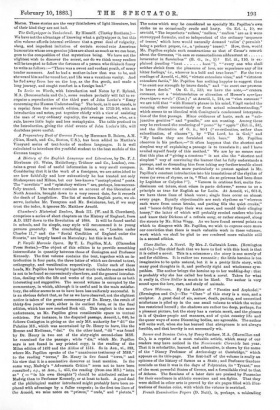P. Vergili Maronis Opera. By T. L. Papillon, M.A. (Clarendon
Press Series.)—The object of this edition is to provide something intermediate in quantity between those of Conington and Professor Kennedy. The first volume contains the text, together with an in- troduction in four parts, the three latter of which are devoted to text, orthography, and versification respectively. Under each of these heads, Mr. Papillon has brought together much valuable matter which is not to be found so conveniently elsewhere, and the general introduc- tion, dealing with the life and works of the poet, strikes us as both interesting and suggestive. The second volume is occupied by the commentary, in which, although it is useful and in the main satisfac- tory, the editor seems to us to have been less uniformly successful. It is an obvious defect that, so far as we have observed, not the slightest notice is taken of the great commentary of Dr. Henry, the result of thirty-five years' work, either in its earliest form, or in the final edition, which has now reached Book viii. This neglect is the more unfortunate, as Mr. Papillon gives considerable space to textual criticism. For instance, in the disputed passage, Aeneid, i., 640, he follows Conington in giving as the only MS. authority for " dii " the Palatine MS., which was ascertained by Dr. Henry to have, like the Roman and Medicean, "del." On the other hand, " " was found by Dr. Henry in two out of the sixty-eight second-class MSS. he examined for the passage ; while "die," which Mr. Papillon says is not found in any printed copy, is the reading of the Milan edition of 1492 and the Aldine of 1514. So in Aen., vi., 383, where Mr. Papillon speaks of the "unanimous testimony or MSS." to the reading " terrae," Dr. Henry in five found "terra," and his view that it is a nominative deserves at least mention. In the same way, Madvig's " Adversaria Critica " seem not to have been consulted; e.g., at Aen., i., 455, the reading (from one MS.) " intra se ( "in his own thoughts") should be attributed rather to Madvig than to Professor Kennedy, or at least to both. A good deal of the philological matter introduced might probably have been re- placed with advantage by a fuller exegesis ; in the first ten lines of the Aeneid, we miss notes on " primus," "nude," and " pietate."
The notes which may be considered as specially Mr. Papillon's own strike us as occasionally crude and hasty. On Ed. i., 10, we are told, "The imperfects venom," nollem," mallem ' are as it were stereotyped formulas, and so independent of the ordinary 'sequence of tenses,' which here would naturally demand velim' (` permisit being a perfect proper, i.e., a 'primary' tense)." How, then, would Mr. Papillon explain such constructions as that of Cresar's remark
about the Germans, "in earn se consuetudinem adcluxerunt ut lavarentur in II:minibus " (B. G., iv., 1) P Ecl. iii., 110, is ex- plained (reading "heat haat "), "'every one who shall neither shrink from the pleasures of love, nor experience any of its bitter feelings,' i.e., whoever is a bold and true lover." For the two readings of Aeneid, vi., 806, "virtute extendere vires," and "virtutem extendere factis," Mr. Papillon has nothing happier to suggest than "to exert our strength by brave deeds," and "to exert our prowess in brave deeds." On G. ii., 529, we have the note,—" craters, coronant, not a mistranslation or alteration of Homer's rclurripar 4wecrr64ccwro woro7o ' (Con.) ;" at Aeneid, 1., 724, on "vie coronant" we are told that "with Homer's phrase in his mind, Virgil varied the meaning either unconsciously or from actual misunderstanding," which seems to us identical with Conington's condemned interpreta- tion of the first passage. Minor evidences of haste, such as "sub- junctive genitive" and " punibo," are not wanting. Among these may be reckoned the rendering of " porno" by " apple " (Ed. ii., 63), and the illustration of G. ii., 80-1 (" co-ordination, rather than subordination, of clauses "), by "The Lord, he is God," and "My banks they are furnished with bees." Mr. Papillon observes in his preface,—" It often happens that the shortest and simplest way of explaining a passage is to translate it ; and I have availed myself freely of this method." We are by no means sure that this plan of "giving a construe" is not also the "shortest and simplest" way of convincing the learner that he fully understands a passage, and so dissuading him from taking any further trouble about it. But what we wish more particularly to protest against is Mr. Papillon's constant introduction into his translations of the rhythm of verse (or even of rhyme, as in, "What sin so grievous had been done by Lapithae or Calydon P"). "Veraum in orations fieri, multo foe- dissimum eat totam, dent etiam in parte deforme," seems to us a principle as true for English as for Latin. At Aeneid, vi., 661-3, we have three lines of blank verse ; single lines occur on almost every page. Equally objectionable are such rhythms as "whereon each wave from ocean breaks, and parting fills the quiet creeks," and "hence deftly forge their wax anew, and mould their clinging honey," the latter of which will probably remind readers who love and know their Dickens of a refrain sung, or rather stamped, along the streets by Mr. Silas Wegg. As we have found several points on which to disagree with Mr. Papillon, we wish to express once more our conviction that there is much valuable work in these volumes, work which we shall be glad to see rendered more valuable still in a second edition.


































 Previous page
Previous page